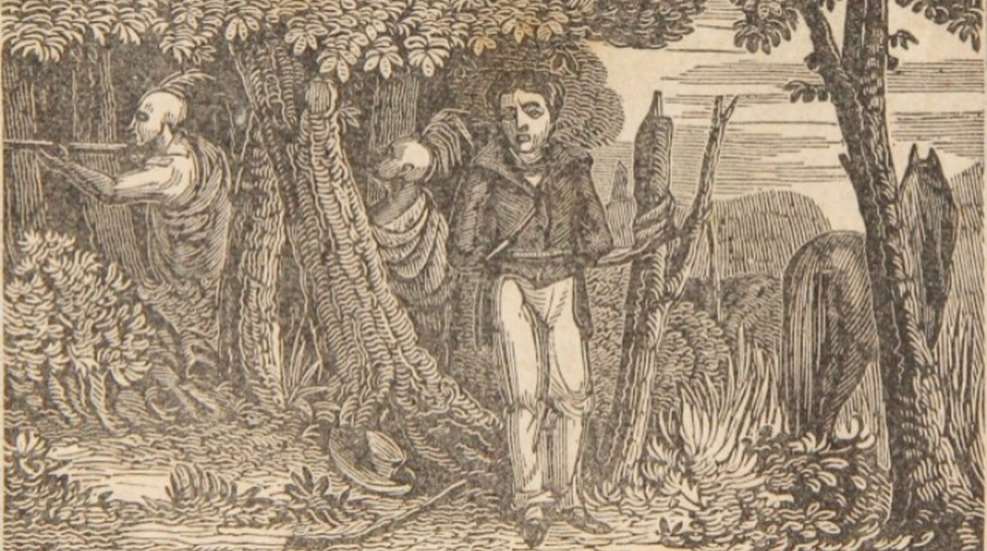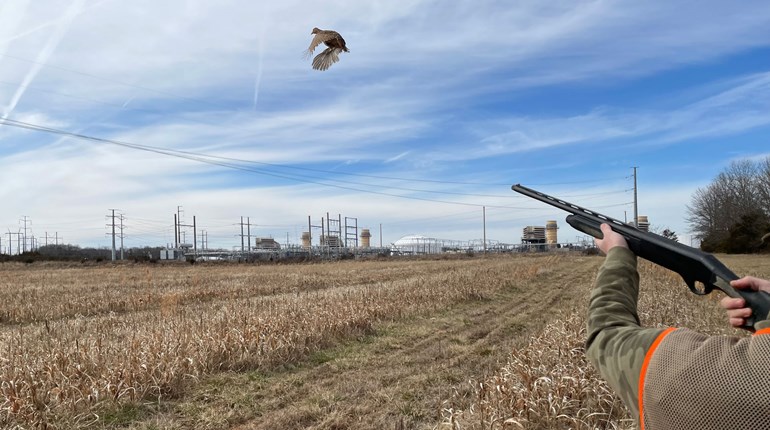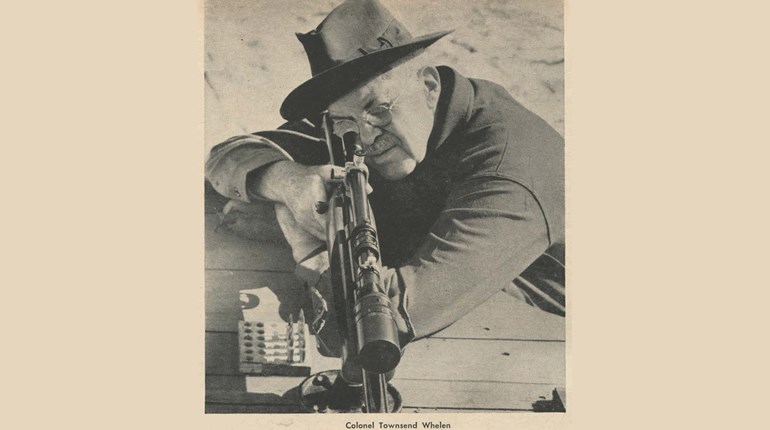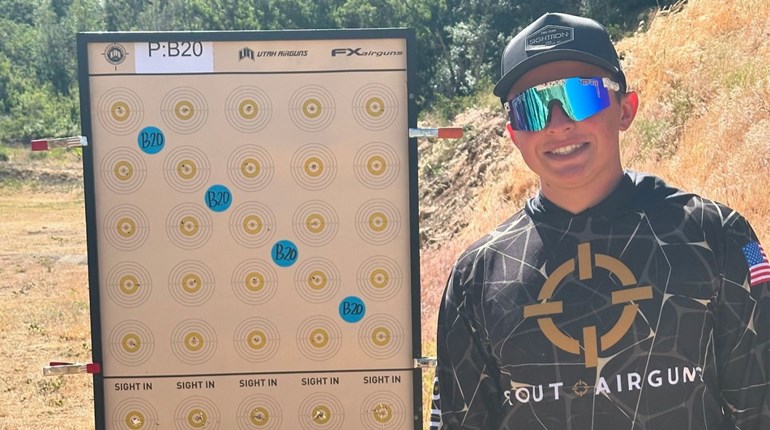
During the late 1700s, those early pioneers attempting to settle along the fringe of the frontier in eastern North America lived under constant fear of Indian attack. Wilderness farms were particularly vulnerable, as these small, isolated settlements were usually poorly defended. Frontiersmen and women certainly kept their muzzleloading rifles handy, but what good was a single-shot flintlock or two against a dozen or more armed, painted warriors intent on destruction?
If the worst happened, as it often did, entire families could be wiped out, save for a young person or two. These captives were then force-marched long distances west—perhaps hundreds of miles—to the Indian towns and villages in the Ohio country, and given little food during their journey. If they survived, upon arrival they faced three possible fates: death by torture, slavery or full adoption into the tribe.
A young James Smith, age 18, was captured in May of 1755 by Delaware Indians, but not from a farm. He was one of some 300 woodcutters that British General Edward Braddock had hired to hack a road through the wilderness for his army during the French and Indian War. Braddock was planning to take Fort Duquesne from the French, located at the confluence of the Allegheny and Monongahela, the two rivers that form the Ohio. (The fort’s name would one day be changed to Fort Pitt, then eventually grow into the city of Pittsburgh, Pennsylvania, but those events were yet long in the future.)
On the day he was captured, Smith felt fortunate that, at least for a few hours, he had been relieved of his woodcutting duties and sent on an errand through the woods with a second man, Arnold Vigoras. However, soon ambushed and fired upon by three Indians, Vigoras was killed and Smith surrendered.
Taken to Fort Duquesne, Smith had all the hair on his head plucked out, except for a scalp lock, then was forced to run through a double-gauntlet line of Indians where he was beaten unconscious. One of his Indian captors later told him that no malice was implied by a gauntlet run; rather, it was simply the Indian version of “How do you do?”
Smith remained at the fort until July 9, when he watched a large number of French soldiers and Indians leave early in the morning and return later that day bearing scalps, carrying hundreds of extra rifles and loot, while prodding along captured, dejected British soldiers. The French and Indians had just routed Braddock’s army in a humiliating defeat, described as one of the most disastrous for the British during the entire 18th Century. And to make matters worse, Braddock himself had been killed in the fighting. Expecting swift retaliation from the British, a few days later Smith was taken even deeper into Indian territory, to a town on the west branch of the Muskingum River.
James Smith’s personal account of his captivity ordeal is unusual in that he left a written record. Of the thousands of whites, and sometimes blacks, taken by the Indians, only a relative few captives took the time to write down the details of their experiences. Here, then, is the remainder of Smith’s story, told in his own words.
“As I, at that time, knew nothing of their mode of adoption, and had seen them put to death all they had taken, and as I never could find that they saved a man alive at Braddock’s defeat, I made no doubt but they were about putting me to death in some cruel manner. The old chief holding me by the hand made a long speech, very loud, and when he had done he handed me to three young squaws, who led me by the hand down the bank into the river until the water was up to our middle. The squaws then made signs to me to plunge myself into the water, but I did not understand them; I thought that the result of the council was that I should be drowned, and that these young ladies were to be the executioners.
“They all three laid violent hold of me, and I for some time opposed them with all my might, which occasioned loud laughter by the multitude that were on the bank of the river. At length, one of the squaws made out to speak a little English…and said, no hurt you; on this I gave myself up to their ladyships, who were as good as their word; for though they plunged me under water, and washed and rubbed me severely, yet I could not say they hurt me much. These young women then led me up to the council house, where some of the tribe were ready with new clothes for me…
“At length, one of the chiefs made a speech which was delivered to me by an interpreter: ‘My son, you are now flesh of our flesh, and bone of our bone. By the ceremony which was performed this day, every drop of white blood was washed out of your veins. My son, you have now nothing to fear, we are now under the same obligations to love, support and defend you that we are to love and defend one another, therefore you are to consider yourself as one of our people.’”
Smith then settled into the day-to-day life of the tribe, and was soon made aware of the mindset of the Indians as it pertained to hunting and how they believed they were supplied with food. An elderly Indian man explained, his dark-brown face wrinkled with age, “Brother, as you have lived with the white people, you have not had the same advantage of knowing that the great being above feeds his people, and gives them their meat in due season, as we Indians have, who are frequently out of provisions, and yet are wonderfully supplied, and that so frequently that it is evidently the hand of the Great Spirit that doth this: whereas the white people have commonly large stocks of tame cattle, that they can kill when they please, and also their barns and cribs filled with grain, and therefore have not the same opportunity of seeing and knowing that they are supported by the ruler of Heaven and Earth.”
The following winter was a hard one, forcing Smith to put that hunting philosophy into practice. Facing starvation, the old Indian reminded him, “Brother, be assured that you will be supplied with food, and just in the right time…rise early in the morning and go hunting, be strong and exert yourself like a man, and the Great Spirit will direct your way.”
“The next morning I went out and…proceeded on slowly for about five miles, and saw deer frequently, but as the crust on the snow made a great noise, they were always running before I spied them, so that I could not get a shot. When I got about 10 or 12 miles from our hut, I came upon fresh buffalo tracks. I pursued after, and in a short time came in sight of them. I ran with all my might [to get ahead of the herd], lay in ambush, and killed a very large cow.”
Smith shared his buffalo kill with the old Indian who had instructed him, and wrote of the event. “When we were refreshed, he delivered a speech upon the necessity and pleasure of receiving the necessary supports of life with thankfulness, knowing that the Great Spirit is the great giver.”
On another hunting trip, this time with other members of his tribe, Smith learned of an odd belief among some Indians concerning certain animals.
“It is a received opinion among the Indians, that [in autumn] geese turn into beavers and snakes into raccoons; and though a chief, who was a wise man, was not fully persuaded that this was true; yet he seemed in some measure to be carried away with this whimsical notion. He said that a certain pond had been always a plentiful place of beaver. Though he said he knew them to be frequently all killed, yet the next winter they would be as plenty as ever. But as this pond was also a considerable place for geese when they came in the fall from the north, and alighted in this pond, they turned into beavers, all but their feet, which remained nearly the same.”
Some captives, after spending years with the Indians, were given an opportunity for freedom—allowed to choose whether they wanted to remain with the tribe or return to white society. Though James Smith always insisted that he had been well treated by the Indians and learned to respect them and their way of life, he left the tribe after five years by boarding a ship in Montreal, Canada, containing English prisoners who were to be exchanged for French prisoners. After five years of captivity, Smith eventually made his way back to his family in Pennsylvania in 1760, commenting, “They received me with great joy, but were surprised to see me so much like an Indian, both in my gait and gesture.”





































